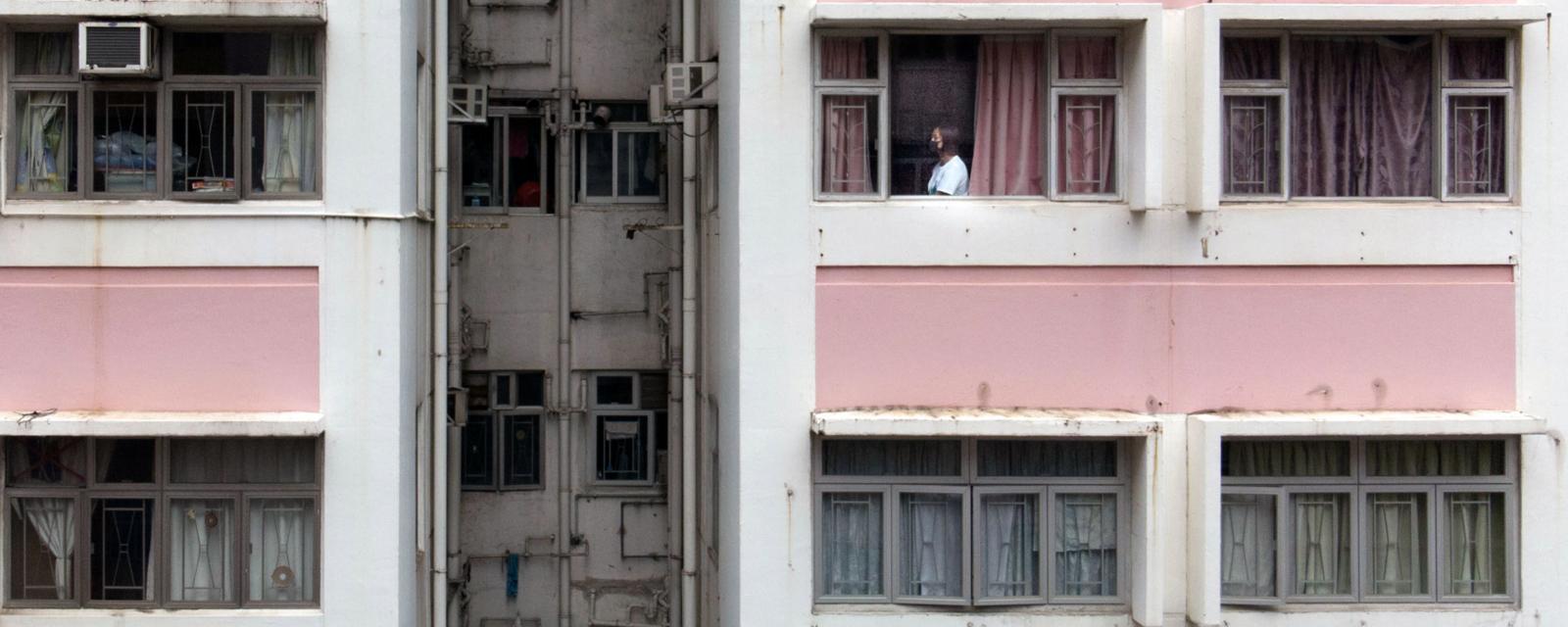Lam Lok and Jason Chau fell in love when they were working at Disneyland in the summer of 2012. He noticed her outgoing personality and she, his strong back. He asked her out to dinner. She said yes. Three years later, they got married and had a child. But, unlike their romance, their living arrangement is far from a fairy tale.
Lok, 31, lives with her parents in North Point, in Hong Kong Island’s Eastern District. It is more than an hour away from the island of Tsing Yi, where 35-year-old Chau lives with his parents. Their three-year-old daughter, Yu, spends Monday to Thursday with Lok and the weekend at Chau’s. They can’t move in together in one of their family homes, Lok says, because the bedroom space is simply too small for two adults and a child.
“I couldn’t bear it at the beginning. We sometimes have doubts about the marriage because living apart makes us feel like we are still single,” Lok says. “It took us over a year to get used to this living arrangement.”
The first month after Yu was born, Lok had a tough time taking care of her, even with Lok’s mother’s help. “My husband couldn’t share the workload of raising Yu as he lives too far away. We also couldn’t watch Yu grow together,” she says.
If this situation sounds like an anomaly, it’s actually becoming surprisingly common in Hong Kong’s ultra-unaffordable housing market. Lok and Chau are among a growing number of couples who are finding themselves priced out of sharing a home together.
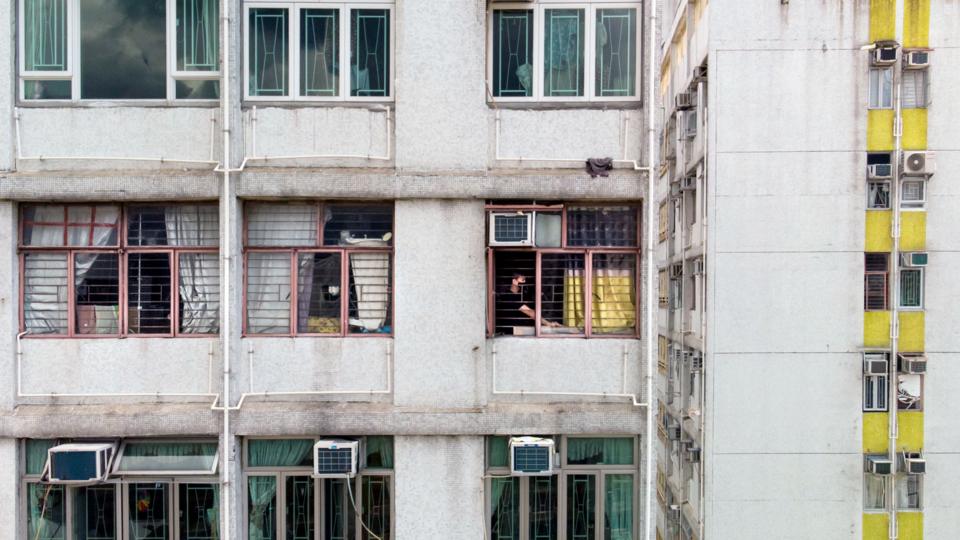
On Tsing Yi island, 35-year-old Jason Chau lives more than an hour from his wife, 31-year-old Lam Lok, and their daughter, three-year-old Yu (Credit: Megumi Lim)
High prices, low expectations
Nearly one in 10 married couples in Hong Kong are not living with their spouses. And of those who do, upwards of 12% of married couples aged 25 to 34 co-habit with parents, according to government data from 2018.
Lok blamed the couple’s housing set-up on restrictive land-use regulations as well as Hong Kong’s property prices, which have been the highest in the world for nine straight years.
According to the 2019 Demographia International Housing Affordability Study, which ranks 309 metropolitan areas in eight countries, Hong Kong is ranked as the least-affordable market. A median-priced house is 21 times the annual median household income; in contrast, a house in the most expensive European market – the Greater London Authority – only cost 8.3 times the annual median household income.
It’s difficult to afford even a single unit within a subdivided flat – an apartment partitioned to house more people – which costs around HK$4,000 ($510) a month. Usually it can only fit a bed.
The median monthly income for Hong Kong workers aged 15 to 24 is HK$10,750, and not significantly higher at HK$21,000 for workers aged 30 to 39. Even if both partners in a couple are earning good professional salaries, “the middle class can hardly expect to own their own home of a decent size”, says Michael Rowse, former director-general of the government’s InvestHK programme.
Anger over the housing plight has helped fuel the current protests rocking the region. Although the protests were triggered by a now-withdrawn extradition bill, as well as concern over Beijing’s influence and the deadlock on achieving greater democracy, frustration over the government’s failure to tackle inequality – the perception that it favours property developers over residents – plus concerns over mainland immigrants’ impact on housing inventory are underlying factors.
Lok, a media worker, and Chau, a Disneyland staffer, both make slightly below-average salaries. They do not pay rent to their parents, but still struggle to save money for a home while paying child-related expenses. “We plan to live together, but it’s not possible in the short-term,” Chau says.
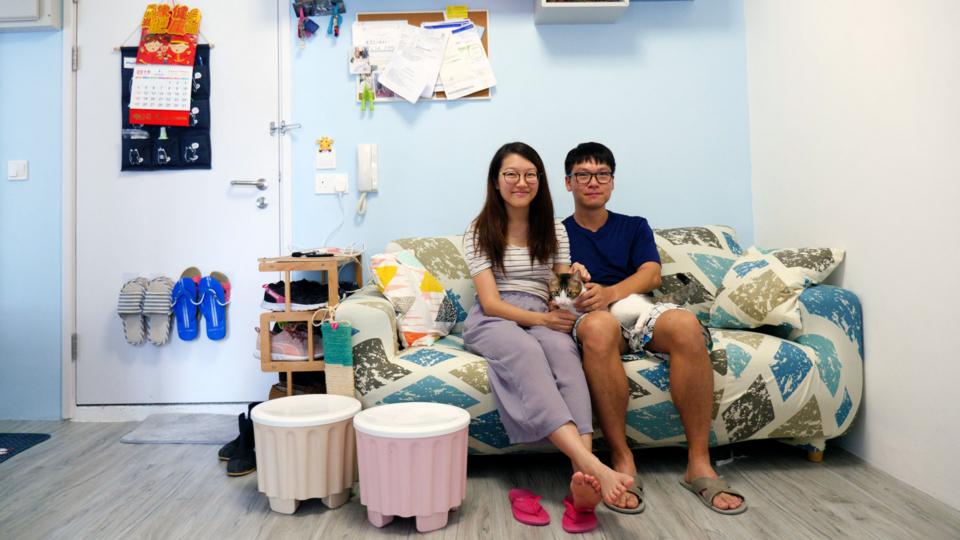
Kathy Tam, 28, and Louis Lee, 32, managed to secure public housing because Lee applied in 2012, years before they got married in 2017 (Credit: Megumi Lim)
Together but separate
In order to co-habit, many young couples in Hong Kong are looking for alternatives to private residences in the form of public housing. But it’s not easy to get a public flat; due to high demand and low availability, the average waiting time for couples is almost five and a half years. As of July, there were 147,000 applicants on the waiting list.
Kathy Tam, 28, and husband Louis Lee, 32, managed to secure public housing because Lee applied for the programme in 2012, years before they got married in 2017. “We were sure about each other at the time, so even without a flat together, we decided to get married,” says Tam.
Because Lee thought ahead, the couple lived apart for just a year before being allocated a 21-sq m flat, which they now share with their cat.
“Not living together in the long-term would have made us feel our family was incomplete, so now we are really grateful we can live together. We wouldn’t think about having children without this,” she says.
Tam and Lee’s reluctance to have children without a shared residence reflects larger implications for the region, because the future of Hong Kong’s population rests in the hands of couples like them. The region has a low and declining fertility rate; its birth rate dropping more than 50% from 16.8 births per 1,000 people in 1981 to 7.7 in 2017, according to government data.
Hong Kong also has one of the largest ageing populations in Asia. The elderly will account for nearly one-third of the region’s population in 2036. If the low birth rate persists, children under 15 will make up just 10% of Hong Kong’s population by 2066.
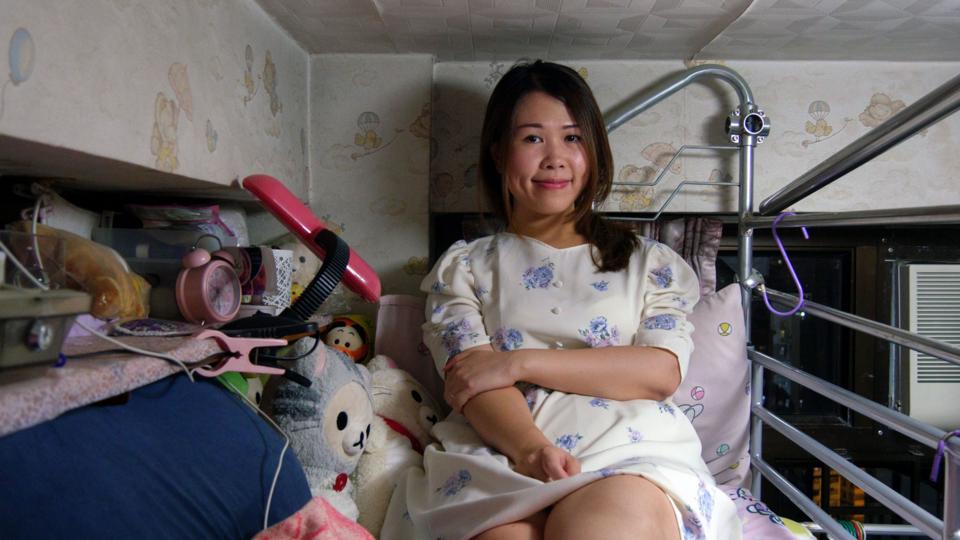
Joyce Leung, 30, lives at home with her family instead of with husband, Wilfred Wong, 30. She sleeps in her childhood bunk bed scattered with stuffed animals (Credit: Megumi Lim)
Keeping the spark alive
Demographics aren’t the only concern when couples live apart, but also relationship fundamentals. How do you keep a marriage healthy when you don’t share a home?
Wilfred Wong and Joyce Leung, both aged 30, are living with their own families: she, in her childhood bunk bed scattered with stuffed animals; he, 40 minutes across the harbour in Kowloon. They understood that they’d have to wait years until they could live together, but married early this year anyway.
Wong says the couple text and arrange phone calls and dates to make certain they stay close. “It sounds weird,” he says, “but living apart can actually keep the spark in your marriage.”
Similarly, Lok and Chau go on dates and trips to Japan whenever their parents have time to take care of Yu. They sometimes spend the night at local hotels, and take Yu to Disneyland for family outings. Each week Chau will try to squeeze in more time with them by walking Yu and Lok home before riding the subway back to Tsing Yi.
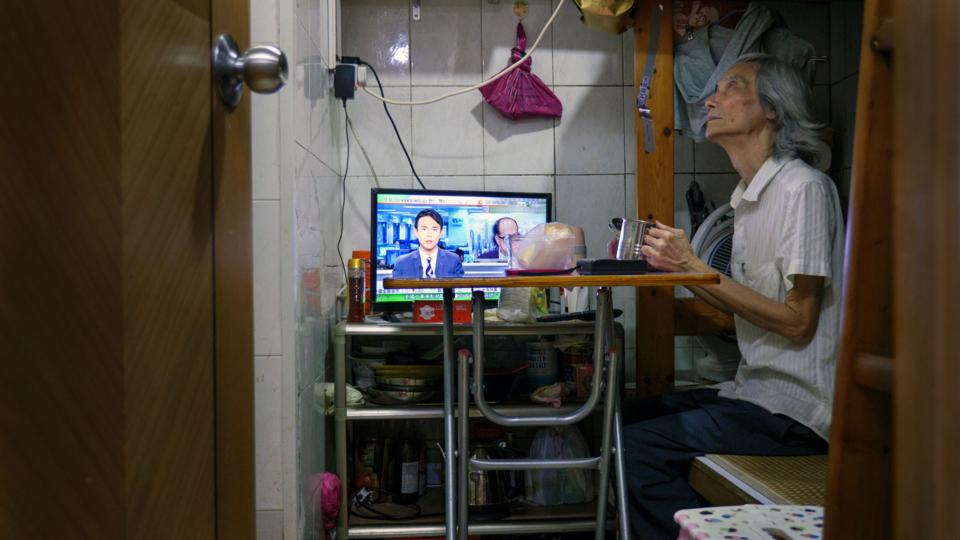
Ma Hoi-shing, 69, lives mostly separate from wife, Jin Guo Fei, 62. Ma’s home, a 5.5-sq m flat, is challenging for Jin to live in due to health issues (Credit: Megumi Lim)
Still, even as couples find time to spend together, living separately can become lonely – regardless of someone’s age.
Loneliness often hits 69-year-old Ma Hoi-shing, a former day worker at a Macau casino. He lives apart from his 62-year-old wife Jin Guo Fei, whom he met while she was gambling. Ma’s home is a 5.5-sq m subdivided flat with no windows, and still costs nearly two-thirds of his monthly government subsidy of slightly more than HK$5,000 ($635). Jin goes back to her home in Hangzhou in mainland China every few months, partly due to her health issues arising from living in Ma’s poorly ventilated flat.
“It’s very small and it’s tough for me to live there,” she says.
Ma has applied for a Hong Kong public-housing flat so both of them can live together in a better environment, but the couple currently only spend a fraction of their time together. Still, despite the difficulties they knew they’d face by mostly living apart, they wed.
Even in their third year of waiting for a government-subsidised flat to share, Jin says that their lives together are very happy. Ma agrees. “I hope we can live together so we can finally start a life that belongs to us,” he adds.

